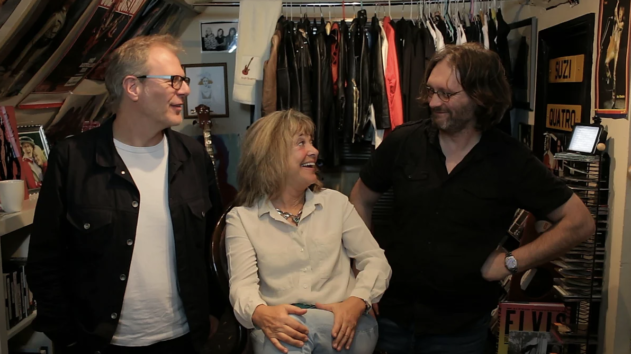The underdog among America’s rock’n’roll legends Suzie Quattro portrayed in “Suzi Q” (and we love an underdog, don’t we?)
Sometimes a girl just needs to rock’n’roll and in director Liam Firmager’s new documentary “Suzie Q” rock icon Suzi Quatro proves she was born to do just that!
Firmager’s film was shot over a four-year period and features an array of musicians who rightfully praise her as an inspiration. Rockers from Joan Jett (who completely idolized Quatro and took over the singer’s leather-clad, no B.S. attitude), Cherrie Currie, Lita Ford, KT Tunstall, Alice Cooper, and Chrissie Hynde all chime in with their love and respect.
Through some amazing archival concert and interview footage, we learn the story of Suzi Quatro, a rock’n’roll legend in the making that took the world by storm … but only achieved cult success in her native America.
Quatro helps narrate her own tale, which adds to the richness of the story. She never gave a sh*t (and still doesn’t!) about the naysayers and people who didn’t think a woman could lead a rock band, let alone become a major success. Quatro is a woman who does not mince words and speaks from her soul. She doesn’t have an attitude, but she has attitude, a most important distinction.
Suzi Quatro was born and raised in Detroit, Michigan and her story begins as it did for many back then. The musician tells about the time she saw Elvis on “The Ed Sullivan Show” and when he swung his hips, Quatro says with a smile as bright as a spotlight, “a lightbulb went off inside me.” From there Suzi was hooked and began mastering the bass guitar. As we learn from this film, Quatro is one of the greatest rock bassists of them all.
After playing bass in The Pleasure Seekers, the band she shared with her sisters Patti and Arlene, Quatro was discovered by British music producer Mickie Most. He gave her a chance to record on her own but wanted only Suzi and none of her bandmates. As almost anyone would, Quatro accepted and her solo career would drive a lifelong wedge between her and her family.
In interviews with her sisters we can still see those pieces of jealousy that have apparently defined their lives and somewhat haunted Suzi’s. It is still hard for them to fully embrace their sister’s fame and good fortune. Suzi’s bitterness exists as well only she refuses apologize for a life she built on her own terms. She has regret but not for herself. It is the hope (one that she holds to this day) that her sisters can let go of any bitterness and that they can be a family again as they move towards their seventies.
Its sad to hear how the family that offered much encouragement was to all but turn their back on Suzi, as her fame came overseas. That is where she had to reside, far away from the tight family unit of the loving Quatro household. The Quatro family felt betrayed by their daughter moving across the world and finding her voice and her fame while Suzi felt betrayed by being emotionally shunned because of her success. It was all an inner family catch-22.
Finding her unique style with leather jumpsuits and a Chuck Berry-like performance style where she attacks the stage using her bass guitar like a weapon, Quatro stormed the British and Australian music charts and to this day is a huge draw overseas.
A fascinating aspect of the film is how, during performances of her hit songs, we see the chart numbers for each country, most of the songs being in the top 3 to 5 in places such as Italy, Australia, Germany, and the U.K. The sad truth being that most of her hits fell way below the quality charting numbers in America with some not charting at all.
It is discussed that Quatro did not want to deal with the bullshit of American DJs at the time. During the early to mid-seventies, the best way to get a record played was to come in and party with the DJs and offer them money and/or drugs. In her own words, Suzi Quatro was not the “Sex, Drugs, and Rock’n’roll” kind of musician. She was the hard rocker on stage but when she came off, she was just Suzi Quatro from Detroit.
This is how she always lived her life. Her way. After a brief touch of fame in America with a three-season stint on “Happy Days” and a hit song that DID chart high in America, “Stumblin’ In,” Quatro continued her musical career but branched out to musical Theater starring in the British production of “Annie Get Your Gun,” which those who surrounded her felt would sully her image. This did not phase Quatro one bit. Her performance received rave reviews which would lead her to write a musical based on the life of Tallula Bankhead, a woman whose spirit mirrored Suzi’s.
Spirit is a good word to describe what flows through his film. Quatro has a driving spirit that flows through her work and life choices and one that has always been there since she was a young girl and continues to this day.
Her drive to reconnect and mend fences has brought her closer to her sisters although a certain resentment still lingers. But Suzi keeps marching on to her own rock’n’roll rhythms.
Suzi Quatro has never allowed herself to be boxed in. When she decided to have two children and be home more to raise them, her then-husband, guitarist and bandmate Len Tuckey thought it would make her less of a rocker and it caused him to pull away with the couple eventually divorcing in 1992. Stuckey wanted to maintain the rock persona while Quatro wanted to be there for her children as much as she could. Again, she could not care less about her image at that point. Frankly, Suzi Quatro being a great musician as well as a great mother is even more badass!
Suzi Quatro overcame family bitterness, near-homelessness, and a shockingly cruel male-dominated and sexist music world to become a star and icon of rock’n’roll. This film is a terrific celebration of her achievements and wonderful spirit. Quatro is completely open about her life and the way she sees things. If some of her views cut too deep, then so be it. Why would she ever mold her own outlook to fit what other people think? That is not how she got to where she is today.
That she never became a bigger star in America is beyond belief. As Joan Jett states toward the end of the film, “She should be talked about more in the lexicon of rock’n’roll.” Nothing could be truer and “Suzi Q” is the film that proves it.
news via inbox
Nulla turp dis cursus. Integer liberos euismod pretium faucibua





